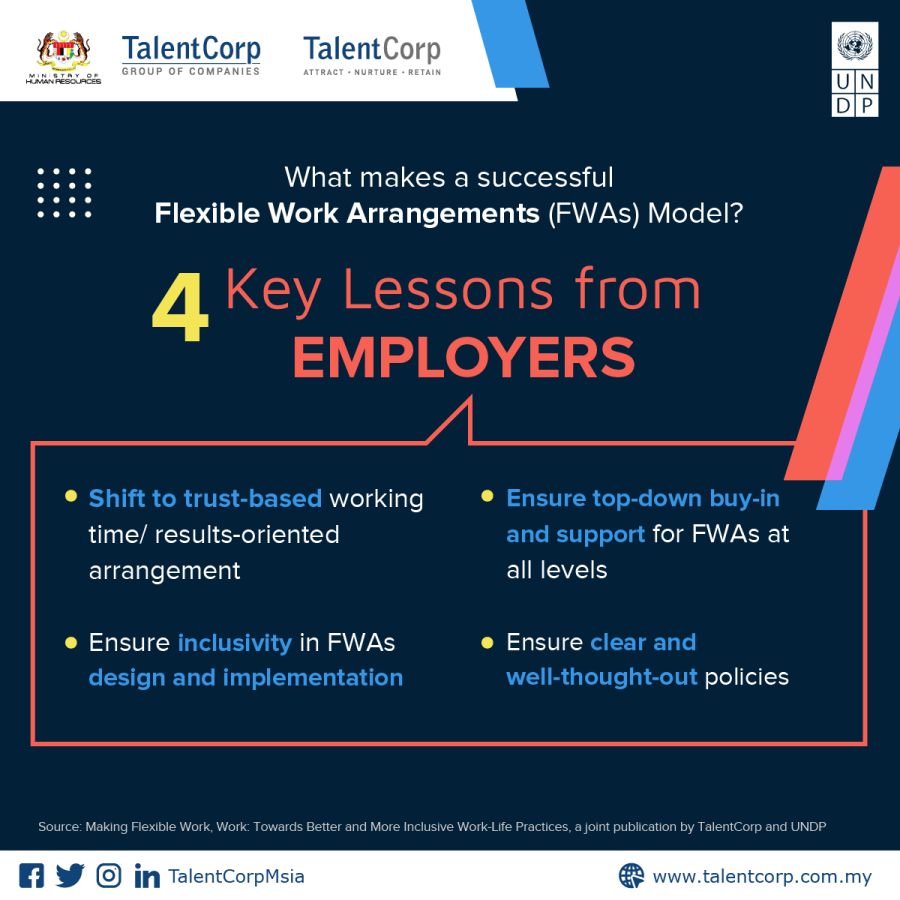Talentcorp and UNDP identifies 8 key factors for successful implementation of Flexible Work Arrangements

“Making Flexible Work, Work: Towards Better and More Inclusive Work-Life Practices” report
Kuala Lumpur, 3 August 2021 - Talent Corporation Malaysia (TalentCorp) and United Nations Development Programme (UNDP) Malaysia today launched the “Making Flexible Work, Work: Towards Better and More Inclusive Work-Life Practices” report. The joint publication is a timely assessment of Flexible Work Arrangements (FWAs) that result in a healthy and engaged workforce, despite disruptions caused by the COVID-19 global pandemic.
Malaysians have experienced Movement Control Orders in various forms (MCO/ CMCO/ RMCO/ FMCO) since March 2020, resulting in extended Work-From-Home (WFH) experience for many working adults. The TalentCorp-UNDP publication compiles critical findings and highlights key lessons derived from the Life at Work and WFH surveys by both organisations to support the successful implementation of Work-Life Practices (WLPs) and FWAs in Malaysia.
“This publication serves as a roadmap for how Malaysian employers can and must take the lead in preparing their workforce for the future of work. TalentCorp’s efforts in this area is in line with the Ministry’s agenda to develop a competent, productive, responsive and resilient national human capital base.” said YB Datuk Seri M. Saravanan, Minister of Human Resources.
Despite the initial unpreparedness of many companies, most employers and employees were able to make WFH work, with many now adopting a WFH Hybrid Model where employees work from home on a rotational basis. Successful adoptees have implemented the following 8 key lessons on FWAs/WFH arrangements:
For Employers:
- Shift to trust-based working time/results-oriented arrangement.
- Ensure top-down buy-in and support for FWAs at all levels; management to adopt mindset that values flexibility, and clearly articulate FWAs values to employees.
- Ensure inclusivity in FWAs design and implementation; prioritise employees with clear needs for FWAs (for example, working mothers), and make FWAs available to all employees.
- Most importantly, employers need to ensure clear and well-thought-out policies that includes providing technical support, material support, clear guidelines and expectations.
For Employees:
- Take initiative to reciprocate FWAs with fair share of ownership; demonstrate commitment and productivity.
- Have accountability - focus on outputs and outcomes, and manage their work time and priorities.
- Ensure constant communication and constructive dialogue with supervisors and co-workers to find workable solutions. Employees with children at home need to apply ground rules to reduce distractions.
- The report also emphasises the need for employees to be familiar with employer policies on FWAs. They need to ensure accountability, but also set limits that help maintain boundaries between work and non-work spheres.

“As the Ministry of Human Resources’ agency tasked to help steer the country’s talent strategy, we are committed advocate for the wider adoption of WLPs in Malaysia,” said Thomas Mathew, Group Chief Executive Officer of TalentCorp. “We continue to amplify our collaborations with the public and private sectors to support the Government in uplifting the well-being of Malaysians via Diversity and Inclusion (D&I) initiatives.”
“The COVID-19 pandemic has swung the spotlight onto some fundamental issues about remote working, flexible working arrangements, office configurations and cost calculations associated with workspace infrastructure. The comfortable equivalence of workplace equals workspace no longer holds, or at the very least, is certainly under interrogation. Attendant soft-side conversations too have sprung up – on motivation, productivity, double-burden, supervisor-supervisee workflows, horizontal/peer interactions and so on and so forth. Ironically, a virus that nearly brought all work to a grinding halt, has also offered up that moment in time to reflect and effect a step-change in the evolution of working arrangements. We welcome this important conversation. And this is our initial contribution to that relevant – and timely - conversation that the Government of Malaysia, the private sector, and the wider rakyat are undertaking,” said Niloy Banerjee, Resident Representative, UNDP Malaysia, Singapore and Brunei Darussalam.
The joint FWA publication is one of TalentCorp’s efforts to optimise Malaysian talent via the Diversity and Inclusion (D&I) agenda by providing end-to-end advisory services to support companies in adopting WLPs. Through the implementation of measures and policies which ensure both public and private sector employees benefit from a range of WLPs including WFH arrangements, TalentCorp aims to see greater recognition of innovative workplace practices as an indispensable tool to drive productivity, boost organisational performance and support the needs and demands of tomorrow's workforce.
To download a copy of the report, please click here.

